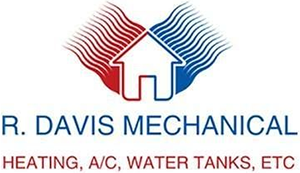FAQs
R. Davis Mechanical
Have a Heating or Cooling related question? We have the answer. Check out these FAQs and give us a call today for more information!
-
How often do I need to change my air filter?
The frequency with which you should change your air filter depends on several factors, including the type of filter, the environment in which you live, and your HVAC system's usage. However, a general guideline is to check your air filter monthly and replace it at least every 90 days. If you have pets, allergies, or live in a dusty environment, you might need to replace it more frequently, perhaps every 30-60 days. Additionally, if you notice the filter becoming visibly dirty before the scheduled replacement time, it's a good idea to change it sooner to ensure optimal air quality and HVAC system performance.
-
What size HVAC unit do I need?
Determining the right size HVAC (Heating, Ventilation, and Air Conditioning) unit for your space involves several factors, including the size of your home or building, the climate in your region, insulation levels, number of windows and doors, and more. It's crucial to properly size your HVAC system to ensure efficient operation and optimal comfort.
The most accurate way to determine the appropriate size is to have the professionals at R. Davis Mechanical perform a load calculation. This calculation considers all the factors mentioned above and provides you with the exact size needed for your specific circumstances.
-
Why is my A/C unit freezing up?
Several factors can cause an air conditioning unit to freeze up:
Insufficient airflow: One of the most common causes is restricted airflow over the evaporator coil. This restriction can be due to a dirty or clogged air filter, closed or blocked vents, obstructed return air ducts, or a malfunctioning blower fan. Without adequate airflow, the refrigerant in the evaporator coil can become too cold, causing condensation to freeze on the coil.
Low refrigerant levels: If the refrigerant level in the A/C system is low, it can lead to a drop in pressure and temperature within the evaporator coil. This drop in temperature can cause condensation to freeze on the coil. Low refrigerant levels can result from leaks in the system, which need to be identified and repaired by a qualified HVAC technician.
Dirty evaporator coil: Accumulation of dirt, dust, or debris on the evaporator coil can insulate the coil and hinder the heat exchange process. This insulation can cause the coil to become colder than intended, leading to the formation of ice.
Faulty components: Malfunctioning components such as a defective blower motor, expansion valve, or thermostat can disrupt the normal operation of the A/C system, potentially causing the evaporator coil to freeze.
Outdoor temperature: Operating the A/C unit at very low outdoor temperatures, typically below 60°F (15°C), can also cause the evaporator coil to freeze, particularly if the system is not designed for such conditions.
Improper installation: Incorrect installation of the A/C system, such as undersized ductwork or improper refrigerant charge, can lead to operational issues, including freezing of the evaporator coil.
Regular maintenance, including cleaning or replacing air filters, inspecting and cleaning the evaporator coil, checking refrigerant levels, and ensuring adequate airflow, can help prevent A/C units from freezing up. If your A/C unit is freezing up, it's important to address the underlying cause promptly to prevent further damage to the system and ensure efficient operation. Call the specialists at R. Davis Mechanical and we can help you will any problems causing your A/C issues.
-
How often should I have my unit serviced?
It is recommended that you have an annual inspection done by a professional HVAC company like R. Davis Mechincal. This will ensure your unit is functioning properly and can help to avoid costly repairs.
-
How can I extend the life of my unit?
Heating and cooling systems represent significant investments, making it natural to aim for their prolonged lifespan. Decreasing usage can be beneficial; adjust the thermostat accordingly to minimize energy consumption when you're away. Regularly changing air filters is essential to prevent clogs. Additionally, scheduling routine check-ups can proactively address any potential issues before they escalate. Call the experts at R. Davis and we can help extend the life of your unit with our maintenance programs.
serving Area
1301 Brownsville rd
Pittsburgh, PA 15210
Pittsburgh, PA
Bethel Park, PA
McMurray, PA
Mount Lebanon, PA
South Park, PA
Upper St Clair, PA
Peters Township, PA
Venetia, PA
Carnegie, PA
Business Hours
- Mon - Sun
- -
Same Day and Next Day Service Available
PA License: PA 170058
PGH License: HV01979

Share On: